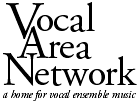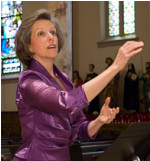 |
 |
Advertise | Sustaining Membership | VAN Store | Feedback
composers and ensembles working together to promote new music
by J.P. Poplawski for Vocal Area Network
Posted August 15, 2008
 Performing ensembles all over the world cherish the impact that programming a
world premiere can have on artists and audiences alike. When the music is good,
there are serious artistic reasons for the promulgation of new and contemporary
works. Moreover, it is hard to deny the special marketing appeal
associated with the very first performance of a work. But, far too often,
even premieres that present works of fine quality may be destined to become
so-called "one-hit wonders." Groups may shy away from contemporary works
that others have premiered, especially when they are formidable. Too, they no
longer have the "new car smell" that a world premiere designation can impart.
Composers, for their own part, realize the value of their artistic contributions
and do not desire to forsake style in order to receive more performances.
Yet, they naturally want to expose as vast an audience as possible to their
music. While the implications can be frustrating, there remains a
potential moral to this story. Rather than functioning as totally
autonomous artistic personalities, composers and ensembles can actually work
together in new ways to guarantee that the shelf-life of a work is lengthened,
perhaps even to the extent that it is made a permanent part of the repertory.
Performing ensembles all over the world cherish the impact that programming a
world premiere can have on artists and audiences alike. When the music is good,
there are serious artistic reasons for the promulgation of new and contemporary
works. Moreover, it is hard to deny the special marketing appeal
associated with the very first performance of a work. But, far too often,
even premieres that present works of fine quality may be destined to become
so-called "one-hit wonders." Groups may shy away from contemporary works
that others have premiered, especially when they are formidable. Too, they no
longer have the "new car smell" that a world premiere designation can impart.
Composers, for their own part, realize the value of their artistic contributions
and do not desire to forsake style in order to receive more performances.
Yet, they naturally want to expose as vast an audience as possible to their
music. While the implications can be frustrating, there remains a
potential moral to this story. Rather than functioning as totally
autonomous artistic personalities, composers and ensembles can actually work
together in new ways to guarantee that the shelf-life of a work is lengthened,
perhaps even to the extent that it is made a permanent part of the repertory.
New Music, Old Problems
Take this recent example as an illustration. Schola Cantorum on Hudson is a
vocal ensemble of forty-five singers founded in 1995 by conductor Deborah
Simpkin King. With membership consisting of active professionals, emerging
young artists, and talented amateurs, the group performs extensively throughout
the New York metropolitan region. In 2006, Dr. King was approached
by Montclair, NJ composer Randall Svane with the opportunity to premiere his
Mass, a choral setting of the Latin Ordinary. In a unique collaboration
with Lauda! Chamber Singers, directed by Charles Walker, Schola gave the work
its inaugural showing in two venues in New Jersey, performing the “premiere” in
both South Jersey (under Mr. Walker's baton) and North Jersey (under Dr. King's
direction). The result was described by Willa J. Conrad of The
Star-Ledger as a "riveting reading of this gorgeous eight-part a cappella score
[...]". At the time of those performances, few could conceive of the impetus
that the work would eventually assume.
Notwithstanding, the inherent problems posed by the work's lush yet dense tonal vocabulary were evident to the reviewer even then, as she remarked about the conductor, "King must also have a good appetite for a challenge, because the preparation of the premiere performances of Svane's Mass were likely intense and fraught with difficulty." While the beauty of the work was unquestionable, its performance difficulties merited some pause over the notion of convincing others to take on the challenge. Conrad concluded her review with a statement that echoes the larger problem, saying, "One hopes these concerts of Svane's Mass help to get the work further performances; it deserves more exposure." Despite being hailed as a quality addition to the choral literature, circumstances are such that a prominent future was by no means certain destiny for this opus.
New Music, New Life
Part of the craft of the composer nowadays is entrepreneurship: networking,
publicity, and marketing one's music in extra-musical ways can be integral to
ensuring performances. Even composers of relative renown must "shop" their
scores around, mailing countless copies to conductors and ensembles throughout
the world in hopes that some will see an artistic need to perform their works.
The scores sent out by Randall Svane were not only of a fine artistic caliber,
but they were enhanced by being accompanied by an actual recording of the work.
The compact disc, recorded live in performance, was of good sound quality, and
it was faithful to the composer's intentions. Amidst the piles of scores
received by busy conductors each year, a recording can sometimes make the work
stand out from all the others. A live recording gives the listener an
accurate picture of the performance problems to be expected using the intended
instruments; a computer-generated sound file cannot.
In the case of his Mass, recipients were interested and intrigued by the composition. The end result was an invitation extended by the Kapellmeister of the Dom in Salzburg to have the work performed in August 2008 during the heart of the renowned Salzburg Festival. The Kapellmeister extended his invitation to Schola Cantorum on Hudson, the choral ensemble whom he had heard on the compact disc, to travel to Austria and give the work its European premiere.
Mr. Svane comments on the invitation, "For me as a composer, there could be no greater honor than to have the European Premiere of my Mass take place in the Salzburg Dom, the very same cathedral in which Wolfgang Amadeus Mozart once served as organist. And to have the renowned American choir Schola Cantorum on Hudson, under the superb direction of Deborah Simpkin King, sing this premiere as part of its upcoming European tour, guarantees a performance of the highest artistic standards."
Ultimately, it was not only the composer who was rewarded in this transaction, but the performing choir as well. In addition to the Mass performance, the group will be spending August 8-19 on a concert tour of Austria and the Czech Republic. In addition to the Svane premiere, the concerts -- titled “American Ambassadors” -- will introduce an all-American program to a variety of European audiences, many of whom lack wide access to our rich choral tradition.
New Music, New Technology
In the web savvy world that we live in, it is not only the advanced recording
technologies and the easier ability to reproduce compact discs that can help to
garner wide-spread attention for new works and their progenitors. Mr.
Svane has advertised the upcoming Salzburg performance on his personal website (randallsvane.com/).
Though it may be somewhat untimely for most of his viewers to purchase a plane
ticket to Austria and attend the concert, with any amount of luck it will
inspire future performers to program Svane's Mass and his other powerful works.
At the same time, the administrative team of Schola Cantorum on Hudson has created an online "choral travel blog" (scholaonhudson.blogspot.com/) so that musicians are able to report on their experiences from the field for audience, family members, and other interested individuals. Postings are also expected to include photos, sound clips and videos. More than a mere travel blog, this is a arts-and-technology experiment that has the potential to be what Schola board chairman Salvatore Diana calls, "a forum for anyone who has thoughts to express about the role of arts organizations, both locally and globally." The blog encourages participation from choral music lovers all over the world-wide blogosphere.
For Randall Svane's Mass, there was a concerted effort on the part of the composer and the performing ensemble to promote this work to audiences and musician-colleagues throughout the region and the world. Because of these efforts, Svane's Mass has cast a wide net over music lovers both in the New York metropolitan region and on the European continent. It has taken more than just the superb artistry that lives between the bar lines to transport the work across the waters in this globalized, technology-driven society. This type of effort will surely become an increasing part of the methods used to attract the new breed of choral music lover. There is no doubt that these efforts ensured that securing a second performance of Svane's Mass was far less elusive than it might have been, and one hopes that a third, fourth and many more performances await listeners in the not-so-distant future. Perhaps as more composers and ensembles follow a similar model, we just may see the blossoming of new works and increased audiences on the horizon.
Schola Cantorum on Hudson was founded by artistic director Deborah Simpkin King with a mission of enriching the life of the diverse New Jersey and New York communities. The ensemble has grown dynamically to embrace a mission of deepening and enlivening the human spirit by offering musical experiences with innovative programming that represents a wide variety of musical styles and all aspects of the vocal art. Schola regularly premieres new choral works and achieves high performance standards through its dynamic music education program.
J.P. Poplawski is a singing member of Schola Cantorum on Hudson, and sits on the organization's committee for Artistic Vision & Education.